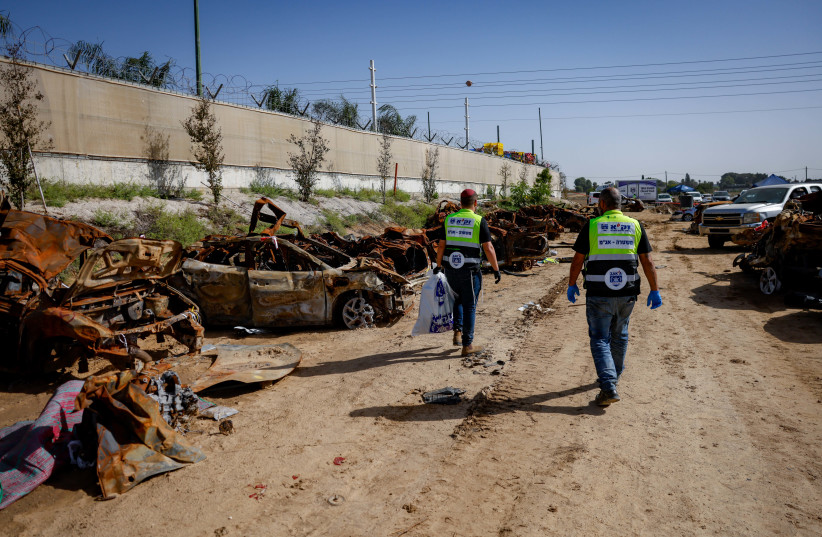‘Why are Israeli men and women so tough and serious?" a student at a South Florida Jewish high school repeatedly asked, fresh from the Israel Defense Forces (IDF), I, an Israeli with American roots, had not previously pondered this.
Israelis might resemble citizens of any other Western democracy in appearance or behavior, yet we are distinct internally. Although I'm not a Sabra (a term for a native Israeli Jew, suggesting toughness on the outside but sweetness within, like the prickly pear cactus), this descriptor effectively encapsulates our national character.
Israelis are not only adept in academia and technology, likened to a mini-Silicon Valley in the Middle Eastern desert, but also carry unique characteristics. Primarily, the majority of Israelis are Jewish, bearing significant historical burdens. Our ancestors or forebears survived the Holocaust and established the world's sole Jewish state amid continents of nations opposing our return to our ancestral homeland.
Consider the disparity: How many Americans have served in the military? How many German children have experienced terrorist attacks against their religious or ethnic group?
The lengthy answer starts with two words: It's complicated.

A childhood punctuated by violence
Let me share a glimpse of my personal experiences, reflective of what an Israeli child endures.
I was very young when my parents immigrated from the US to a new community in Samaria, labeled a settlement, encouraged by the Israeli government. Only as an adult did I realize that I, along with most of my childhood friends, likely suffered from post-traumatic stress due to numerous, violent terrorist incidents during the First Intifada.
Traveling through several Palestinian villages to reach our home, we often encountered rock-throwing incidents, resulting in shattered windows. Consequently, we were advised to replace car windows with plastic for safer passage. However, following the Oslo Accords, our Palestinian neighbors became armed, rendering the plastic windows ineffective.
As a child, I vividly recall the fear while traversing these villages. I frequently dreamed of being stranded in one of these Palestinian towns alone, searching for my parents. Despite having a gated community with security, I often wondered why a large group hadn't attempted to invade our settlement en masse.
Growing up, I was accustomed to frequent bus explosions by suicide bombers. Our medical teams, unfortunately, became adept at responding to such attacks, due to their extensive experience. One childhood friend lost a brother in an IDF helicopter accident; a middle school teacher was fatally shot in his home along with his wife, son, and father-in-law.
Years later, a terrorist attack at a local mall witnessed by my mother resulted in the deaths of several neighbors, including children. My best friend retains a bolt in his thigh from an attack he suffered at age 18 in central Jerusalem.
My worst fears materialized
On October 7, my fears of Palestinian terrorists infiltrating a community and perpetrating a Jewish massacre materialized. Terrorist attacks, previously confined to buses, malls, or city centers, evolved in 2023 with home invasions and brutal killings or kidnappings.
Western psychology has yet to develop therapy for young children who witness such atrocities, including kidnapping and exposure to the corpses of neighbors and friends. How does one treat a three-year-old girl, separated from her family and confined underground for weeks without adequate sustenance?
Many men in my neighborhood are absent, serving in the military reserves. Countless families have transitioned to single-parent households. Numerous Israelis have been unable to return home for months, residing in temporary accommodations due to life-threatening conditions. This reflects our commitment as a Western democracy to protect our citizens, in stark contrast to terrorist organizations violently exploiting and ruling over their populations.
Before hastily labeling Israel an apartheid state or accusing it of "ethnic cleansing," consider its true nature: an intricate, vulnerable democracy. A nation that wandered for two millennia is now finally back home. Evaluate us as a country striving to avoid civilian casualties, even at the risk of our soldiers' lives. In civilian areas, the IDF's conduct is arguably more humane than any other Western democracy, certainly surpassing the US and others.
Western media and people in Western countries struggle to comprehend Israeli society when viewing through their lens. Although Israel aligns with Western democratic values, its geographic placement in the Middle East, surrounded by millions harboring antisemitic views and opposing Israel's existence, sets it apart.
Israel's cultural achievements, like diverse representations in the Eurovision Song Contest and successes in sports like the Euroleague basketball, contrast with the geopolitical reality of neighboring countries like Syria and Lebanon, not France or Switzerland.
Israel, amid being in continuous survival mode for over 75 years, has numerous areas to improve, change, or reassess. Its decisions are often politically incorrect, necessitated by its hostile surroundings. Yet, it has managed to excel in various fields.
Therefore, I implore you to refrain from judging us through Western eyes. Please acknowledge the complexities of our existence, and recognize the multitude of aspects beyond your understanding.
